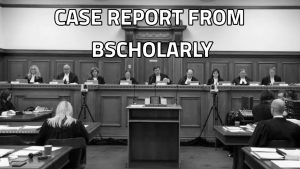The legal history of the principle established in Combe v Combe [1951] 2 KB 215 started with the Pinnel’s case in 1602. The principle in Pinnel’s case gave the promisor (creditor) the right to make and break his promise at will. Pinnel’s case established that “the fact the promisor accepted a lower sum of what the promisee(debtor) is owning him does not mean he cannot go back and demand for the remaining balance.

Suppose that Mr. A owes Mr. B #200. And Mr. B meets Mr. A on the way and requests for his money. Mr. A begs to pay only #100 because of hardship, Mr. B accepts this and A pays the #100 instead of #200, Mr. B can turn around and demand the remaining sum of #100. The reason is simply that when Mr. A paid that #100 instead of #200, Mr. A is merely discharging his duty to Mr. B to pay. Mr. B’s promise to Mr. A has not been furnished with a consideration because Mr. A is merely discharging his duty, no new value was placed.
The promisor can therefore probate and reprobate at the same time. He can make a promise that the promisee should forget the remaining sums and still come back to claim the sums he promised the promisee not to pay.
As the principle was harsh and unjust, the erudite Lord Denning of the blessed memory in Central London Property Trust Ltd v High Trees House Ltd (The rule in High Tree’s case for short) abolished the principle in Pinnel’s case to the effect that once a promisor has made a promise that the promisee should forego the remaining balance and the promisee has relied on it or acted on it believing that he(promisee) will no longer pay the remaining balance, the promisor is estopped in equity from turning around to claim the remaining sum.
The question which was then answered in Combe v Combe is whether the rule in High Tree’s case can be used as a shield or a sword?
Must a party wait for the promisor to enforce his claim wherein he can rely on the defence of equitable estoppel or can he institute an action to enforce the promisor’s promise?
Suppose that a landlord has promised his tenant that he (the tenant) should forego the remaining monthly house rents when the landlord noticed that the tenant was poor and could not even pay for his child’s school fees. can the tenant institute an action in court to enforce the landlord’s promise when the landlord is about to eject him from the house because of the remaining house rent? (in this sense, it has been used as a sword).
RECOMMENDED: Exceptions to the rule in Rylands v Fletcher
Facts of Combe v Combe
A husband promised his wife that he will be paying her annual allowance of £100 (hundred pounds) for her maintenance following their divorce. The husband did not keep to his promise and the wife who did not even furnish any consideration instituted an action in the court to enforce that claim.
Kindly watch the video below for more information on the facts of Combe v Combe [1951] 2 KB 215
Also see: How to answer law law questions using IRAC Method
Issues determined
1. Whether the rule in High Tree’s case be used as a sword?
2. Whether the rule in High Tree’s case can be relied on by a person who has not furnished any considerations to the promise.
Also see: Best online universities in the world to attend
Judgement of the court in Combe v Combe
The house of lords answered the two questions in the negative. It is an established principle of contract law that he who does not furnish any consideration to a promise cannot rely on the same except if it is executed by deed.

It follows therefore that even the rule in High Tree’s case does not dispense with the necessity for consideration as a vital element in the formation of enforceable contracts. Therefore, mere promises not followed by consideration furnished by the promisee amounts to nothing as the principle has been firmly fixed in the law of contract. This case does not fall under one of such cases where the court could have held otherwise. The trial court was therefore in error to allow her claim to stand as she furnished no consideration as regards the promise.
Secondly, the rule is not to be used as a sword. The promisee must wait for the promisor to enforce his rights before he(promisee) can then rely on the promise as a defence or shield so as to succeed. This case therefore comes in as one of those limitations to the rule in High Trees case.
The rule in High Trees case has been followed in the Nigerian case of Offiong v ADC Ltd. Here, ADC Ltd had granted the Appellants offer to accept and forego the balance of £346 13s 4d that they were owning him instead of the total sum of £600. He was also allowed to leave the company with the car and without any further payment. When a new management came in, an action was commenced in the court to compel the appellant to pay the remaining balance having not furnished any considerations for the first offer of foregoing the balance.
The court in rejecting the argument held that estoppel as established in the High trees case applies here since the company cannot go back to their own words. Had it been it was the appellant that tried to rely on this estoppel, then it would have failed because he didn’t furnish any consideration to that effect and it will now be used as a sword.
The big question whether estoppel can be used as a shield or a sword has generated heated debates. In Nigeria, it does appear that some courts have held in the contrary that the rule in High Trees case can be used as a weapon of attack. In the hypothetical facts we stated above where the landlord who made a promise to his tenant turned around to demand for the same money he promised not to demand. In this circumstance, what will the tenant do if estoppel cannot be used as a sword?
Indeed, in Obafemi Awolowo University v Dr Onabanjo, the court actually recognized that “it is not entirely correct as has been said that estoppel can never be used as a sword… Whether or not estoppel can be used as a sword actually depends on the very nature of the claim, and the facts and circumstances of the case”. This shows that there is no hard and fast rule as to when estoppel can be used as a shield. Stating that it can only be used as a shield is not cast in the stone. It is flexible.
In this case, serious Allegations of improper conducts were reported against the Respondent wherein a panel was set up. The respondent’s appointment was terminated without notice given to him. He filed an action in the court to declare such termination null and void and of no effect. Part of his argument was that he is still an employee of the University based on the conduct of the university because they continued to pay him. Relaying on this, it appeared that the appellants continued to accept him and cannot go back on thier conduct except by due process. When the Appellants noticed the direction of the argument, they then urged the court to discountenance such arguments because estoppel which arose from conduct here cannot be used as a sword.
The court disagreed with the appellants, holding that whether or not estoppel can be used as a sword depends on the facts of each case. Since fair hearing was not given to the respondent, the purported dismissal is null and void.

Edeh Samuel Chukwuemeka, ACMC, is a lawyer and a certified mediator/conciliator in Nigeria. He is also a developer with knowledge in various programming languages. Samuel is determined to leverage his skills in technology, SEO, and legal practice to revolutionize the legal profession worldwide by creating web and mobile applications that simplify legal research. Sam is also passionate about educating and providing valuable information to people.